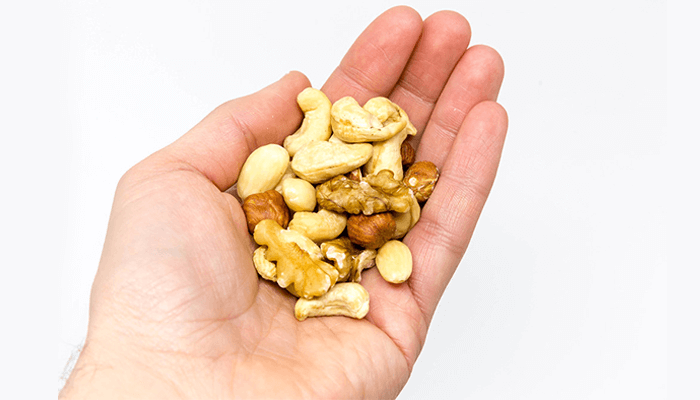Table of Contents
Nuts are delectable, aren’t they? But did you know that eating nuts are good for your heart health? They’re packed with unsaturated fatty acids along with other essential nutrients. Plus, they’re just the perfect snack food; easy to store and easy to have on-the-go. They are, however, high in calories, which is why you shouldn’t go nuts while having nuts (don’t have more than a handful). Nonetheless, choosing them over other snacks is much more healthy for you.
Every food or snack you have should be consumed within a limit. Undereating or overeating, both lead to several problems. Trying to lose or gain weight? Get customized daily diet plans from certified nutritionists with FITFEAST – a health service by FITPASS. You can track your calorie and water intake along with maintaining meal logs in the app. FITFEAST makes it easy for you to get your daily nutritional needs.
Benefits of Nuts on Your Heart

- Nuts strengthen the lining of your arteries
- They reduce inflammation, which is associated with a lower risk of heart disease
- Reduced risk of heart attacks due to blood clots
- Lowered LDL or bad cholesterol and triglyceride levels that contribute to plaque formation
Other Benefits
Nuts are packed with proteins and they do contain some saturated fats. They contain the mineral magnesium along with Vitamin E. Although the benefits of nuts do not include weight loss, many studies suggest that people who consume nuts regularly are likely to live longer than those who don’t. This benefit of nuts is attributed to their ability to prevent the onset of chronic illnesses.
By reducing risk factors like high blood pressure and cholesterol levels, nuts reduce the risk of metabolic syndrome. In a study that involved 1,200 people who ate nuts along with a Mediterranean diet were at a lower risk of getting metabolic syndrome as compared to those who consumed a low-fat or a Mediterranean diet with olive oil.
Nuts are also known to reduce the risk of certain cancers in addition to improving blood sugar levels.
Nuts Contents
- Omega-3 Fatty Acids
Nuts are only second best to fish when it comes to omega-3 fatty acids. They are healthy fatty acids that prevent the possibility of irregular heartbeats and heart attacks.
- Unsaturated Fats
Nuts contain monounsaturated and polyunsaturated fats, both good fats that lower bad or LDL cholesterol levels in the blood.
- Vitamin E
The nutrient adds to the benefits of nuts by preventing the buildup of plaque in the arteries. Plaque narrows the arteries and the blood finds it difficult to pass, which leads to the heart having to work harder than usual. Plaque laden arteries can cause chest pain, coronary heart disease, and heart attack.
- Fiber
Fiber is one portion of foods without which our digestive tract would malfunction. It lowers cholesterol levels in addition to helping you eat less. Fiber expands in the stomach and makes you feel full. Also, fiber reduces the risk of type-2 diabetes.
- L-arginine
L-arginine is a substance that improves artery health; it makes them flexible and prevents blood clots that can block blood flow.
- Plant sterols
Plant sterols are associated with reduced levels of cholesterol. Some fruit juices contain added plant sterols but nuts are natural sources.
How Many Nuts Per Day Can I Eat?

Nuts benefits are available for your body if you eat them within a limit. Some nuts are up to 80% fat, which is why you should eat them in moderation even though they are healthy fats. Most experts claim that a handful of nuts a day is enough. A couple of tablespoons of nut spread are enough to substitute the saturated fats in dairy, eggs, and meat.
Consuming up to 4 servings of dry-roasted nuts every week is recommended but do not cook them in oil. One serving equals around 40 grams. However, the benefits of nuts do not substitute the adverse effects of eating saturated fats found in meat and dairy products.
What Types of Nuts Should I Eat?

Almost all the nuts benefit heart health so it doesn’t really matter which type of nuts you choose to eat. However, they vary in their nutritional value; walnuts contain high amounts of omega-3 fatty acids. Hazelnuts, pecans, almonds, and macadamia nuts are good for the heart. Peanuts are commonly known as nuts but they are legumes really; they are heart-healthy as well. But chocolate, sugar, or salt-covered nuts are unlikely to be good for your heart health. Apart from the quantity, make sure they’re not processed.
You can also choose nut oils for their nutrient value but they lack the essential fiber contents. Using nuts oil for cooking and as a salad dressing is a good idea. However, nut oils react differently to heating as compared to vegetable oils; they become bitter when overheated. Walnut oil contains the highest amounts of Omega-3 fatty acids.


